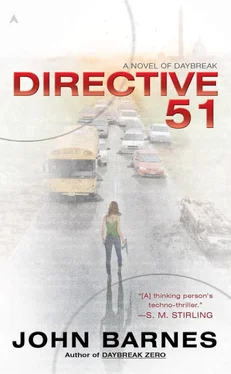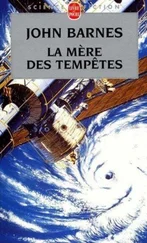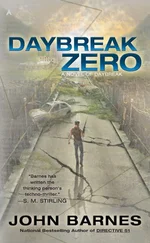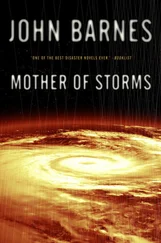“And did you mean it and believe it?”
“I—well, I guess—I said it. I can act like I mean it. And I have to think it’s the right thing to do.”
“What if you had to say that to that man’s little boy?”
“Lincoln managed to write the letter to Mrs. Bixby.”
“Dr. Weisbrod… are you Lincoln? And is the issue slavery?”
“The issue is a house divided.”
“Which could come back together in just about two years—if there’s not too much blood between the people by then,” Heather said. Everyone stared at her. “Sorry, I’ll shut up.”
“It is indeed a day for miracles,” Cameron said, quietly, and then Graham laughed, and even Chris did.
“Let me suggest something,” Chris said. “When Heather suggested this to me… well, what reporter can resist asking the questions of history? And all right, we’ve determined that I can make you both very uncomfortable—”
“Because war is wrong,” Cameron Nguyen-Peters said. He was no longer looking away, but at all of them, each individually. “Because like it or not you always end up making all those horrible decisions. Which you can always make… always …” He seemed to be finding anger somewhere deep within. “Decisions you can always make by just making them in words. ‘The principle of proper Constitutional succession is important enough to send soldiers who are stressed out of their minds and literally driven mad into an area where no one is watching them, where they may catch a mother and her ten-year-old daughter, and rape them in front of each other and leave them with their throats cut for the family to find later.’ And shit like that happens in civil wars; it’s the kind of thing that happens with half-trained troops that get thrown into battle, see their friends killed, rebuild their whole minds around hate. If you just think in words you can say, ‘Sorry, too bad for that little girl, must be hard on her mother to watch that, kind of tough on the soldiers to live with that afterward’—but when you start to think about, oh, that the little girl smiles like nobody else in the world ever did before or will again, or that she and her mother have a favorite joke that only the two of them know… Heather, this wasn’t a bad idea, but I’m not sure the world is ready for it.”
“Can’t find out if the world is ready if we never try it,” Heather said.
Graham laughed sadly, and said, “Twenty years after telling me, screaming at me really in my office, that it didn’t make any sense, my favorite student adopts Gandhian futurism.”
Cameron looked the question at Graham.
The old professor pushed his glasses up his nose and explained as if an undergrad had asked an obvious question. “Gandhi pointed out that one of the most important lessons of history is that many things happen that have never happened before. So just because something never happened or never worked or people weren’t ready… well, next time could be different.”
“Like Daybreak,” Cameron said softly.
“We’ve only been talking half an hour,” Chris said. “And I am looking at two guys who don’t look to me like they want a war.”
“We didn’t, exactly, before,” Graham said, sounding very unsure.
“Or we didn’t want to face it,” Cameron said. “If it’s all right with you, Graham, I’d like Chris to read us more stories. And ask us more questions. If we really need to have a war… considering how terrible it will be for other people—shouldn’t we be able to face an unpleasant hour and a half? I mean, actually, we should have to face a lot more, but—”
“Agreed. That we should have to face up to what we’re doing, I mean. I don’t think I’m eager for this. But I think you’re right, we should.”
In the next hour and a half, Chris introduced them to forty or so Americans, post-Daybreak, and Heather thought he’d never been better, not on television, or radio, or even in print. He probably figures lives are depending on it. Must be good to work like lives are depending on you. Chris drove on—how many victims in the crossfire would be worth it to make a given statement? how many burned libraries? how many men with hideous crimes in their memories for the next fifty years?
“The dogs of war,” Graham said after a while. “Cry havoc and let slip the dogs of war. That’s what Shakespeare was talking about, that once you let them loose, they get… excited, they bark each other into a frenzy, they want to do more and more… they’re only safe on a leash, never when turned loose. Not even when you must turn them loose, and of course, Cam, if there is a surviving Daybreak out there for us to fight, we will have to turn them loose. But whenever you do, the dogs of war will tear up whatever they can get—your enemy, sure, but everything else too…and to turn them loose on a friend, or a relative, or someone who is just trying to do the right thing by their own lights…”
They let the question hang while Chris pushed them again, making them think about how long it takes to put a railroad line together with hand tools, and how little time it takes to put a hole in it; then about what it must feel like to be on the road, walking away from the home where you had everything, where you’ll never return, and with no idea where you’re going to go. And they talked about the strange power of words—not just the little holes and gaps in the Constitution, but the slippery points in every principle and idea, in every story all people tell themselves—
The lights went out; everyone froze, and Heather walked to the window, leaned out, and said, “Power off everywhere, that I can see.” She shouted to a runner downstairs.
A few minutes later, they had a radio that had been stored in a Faraday cage, and Heather was trying to raise Arnie at the research facility at Mota Elliptica.
The response came almost at once; he too had pulled out a spare radio from a shielded cage. “We got ’em,” he said. “We definitely got ’em. We had a great big EMP here, and Cam’s radars worked, we have a trajectory from just before it went off.”
“And have you traced it back?”
“Well, that’s the weird part,” Arnie said. “Um.”
There’s no place so terrible that I won’t be relieved to know it is where the enemy is. “Where did the bomb come from, Arnie?”
“It entered at escape velocity almost straight down, boss. So we don’t exactly know where it came from—”
“Damn, can you narrow it down?”
“Well, that’s what I’m trying not to say. We sure can. On that trajectory the one thing we know for sure is it didn’t come from Earth.”
Cam leaned forward. “Could it have come from the moon?”
“That would be my first guess,” Arnie said. “But definitely not from Earth.”
After they signed off, Chris said, “Well, your two hours expired, a while ago, but…”
“But we’ve established that whether it’s an enemy or a leftover booby trap, it doesn’t want us to make peace, and we would like to,” Cameron Nguyen-Peters said. “Shall we, Graham?”
“We shall.” Graham Weisbrod seemed to sit straighter, and some of the age seemed to fall off him. “I don’t know what we’re facing either, but whoever or whatever it is, I’d make peace just to spite it.”
Chris glanced up from the notes he was making. “And is that the only reason?”
“No, not at all,” the two leaders said, in unison, and laughed like any two men sharing a coincidence.
TWO DAYS LATER. BEGINNING AT MIDNIGHT. WEDNESDAY. MAY 1 (KNOWN AS OPEN SIGNALS DAY EVER SINCE).
It was a world of crystal sets and home-built antennae, by now. Most people did not have radios, but nearly everyone had a friend who was an inveterate listener. The EMP on Radio Perth had put an end to high-power continuous broadcasting, but stations slipped on and off the air in short bursts, and radio stations on sailing ships were beginning to move out into the world’s oceans. Radio Free Pacific broadcast two or three hours of English or Japanese at irregular intervals. Mostly it broadcast stories from the Pueblo Post-Times , or a few coastal papers in North America; now and then it broadcast grim eyewitness reports from the Asian coast. Once it ran an hour in Russian about a town in Kamchatka that seemed to be doing well.
Читать дальше












